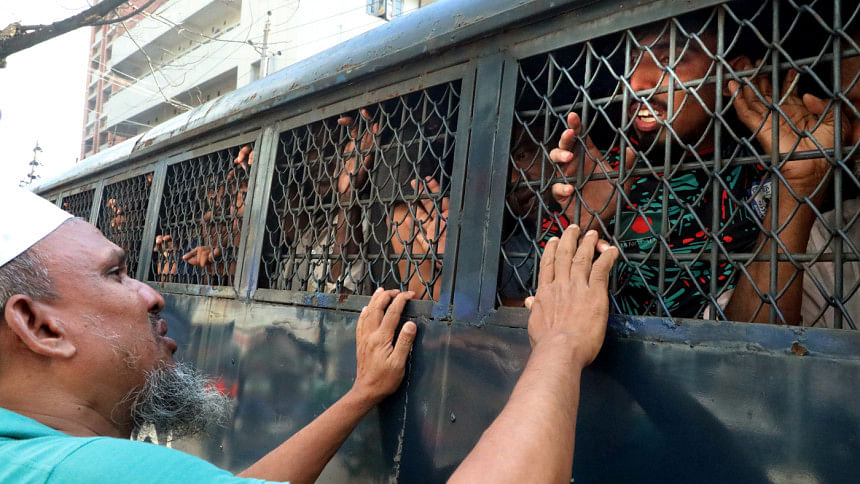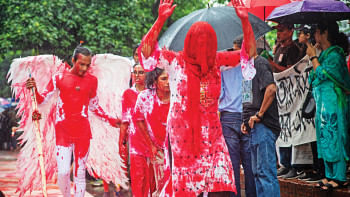July 25, 2024: A nation in grief and defiance

On July 25, 2024, two more individuals -- Zaman Mia, 19, a garment worker from Narsingdi, and Zakir Hossain, 29, a tailor shop employee from Rayerbagh --succumbed to their bullet wounds at Dhaka Medical College Hospital, according to hospital sources and their families. Their deaths brought the official death toll since July 16 to at least 156, including three members of the police force. Thousands more had been injured in clashes that pitted protesters against state forces, often backed by ruling party activists.
Public hospitals struggled to cope with the flood of casualties. At the National Institute of Traumatology and Orthopaedic Rehabilitation (Nitor), the human cost of the violence was etched into every bed. Md Rifat, a 10th-grade student from Badda Alatunnessa Higher Secondary School, lay staring at the absence of his right leg. He was shot in Rampura on July 19 while drinking sherbet and watching events unfold. "I just wanted to see what was going on. I wasn't protesting," he said, choking back tears. After two surgeries, doctors were forced to amputate his leg from the knee. "I don't know whether I'll be able to go to school again," he whispered.
In the same ward, Imran Sarkar, a fourth-year philosophy student at Dhaka College, was trying to adjust to life without his left leg. He was shot in Rayerbazar on July 19 while returning home from Juma prayers. "All of a sudden, a bullet hit my left leg and I passed out," he recounted.
Amid this mounting human toll, the state's crackdown intensified. Over the past six days, at least 4,784 people had been arrested across the country. The BNP claimed that its joint secretary general, Shahiduddin Chowdhury Anne, was picked up by the Detective Branch from Elephant Road around 4:30pm.
Meanwhile, digital silence prevailed. Social media platforms remained blocked, enforced by international internet gateway (IIG) operators on orders from the Bangladesh Telecommunication Regulatory Commission. Facebook, Messenger, WhatsApp, TikTok, and others were inaccessible. The previous day, state minister for ICT Zunaid Ahmed Palak had accused companies like Facebook and YouTube of failing to comply with Bangladeshi laws, prompting the government's clampdown on digital platforms.
The international community responded with growing concern. The United Nations and Amnesty International issued strong statements calling for an end to the violent repression of protesters and the restoration of communication channels. UN Human Rights Chief Volker Türk demanded that the government disclose the names of those killed, injured, or detained, and offered UN support for investigating the alleged human rights violations.
Back home, then-prime minister Sheikh Hasina visited the vandalised Mirpur-10 metro rail station and urged citizens to hold the perpetrators accountable. "They [the people] have to try the culprits. I am seeking justice from them," she said. Awami League General Secretary Obaidul Quader added that the prime minister would personally take responsibility for supporting the families of the deceased.
The government declared that the ongoing nationwide curfew would continue until further notice. Meanwhile, BNP Secretary General Mirza Fakhrul Islam Alamgir demanded an international investigation into the protest-related casualties, dismissing the government's proposed judicial inquiry as a cover-up. He also called for compensation for the families of all those killed, including police and Ansar members.
Transport disruptions persisted. Bangladesh Railway announced that all passenger and freight train services would remain suspended until the situation stabilised.
Despite these challenges, the protesters vowed to continue their movement. A statement issued by Abdul Hannan Masud, a protest coordinator, announced that prayer gatherings would be held in mosques and temples to mourn the dead. Emergency medical teams would also be formed to support the roughly 15,000 injured demonstrators nationwide.
As July 25 came to a close, Bangladesh stood at a painful crossroads. A movement born from frustration had now become a national reckoning. In the face of death, disability, repression, and silence, the call for justice remained unrelenting. The people were not only mourning the dead -- they were refusing to forget them.

 For all latest news, follow The Daily Star's Google News channel.
For all latest news, follow The Daily Star's Google News channel. 






Comments